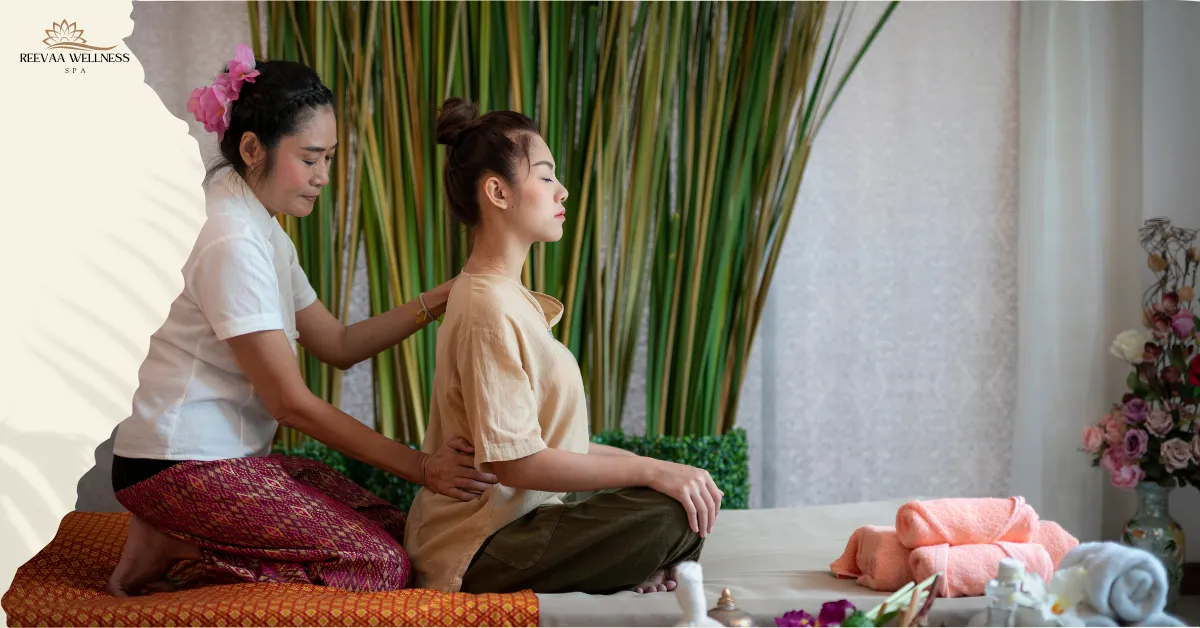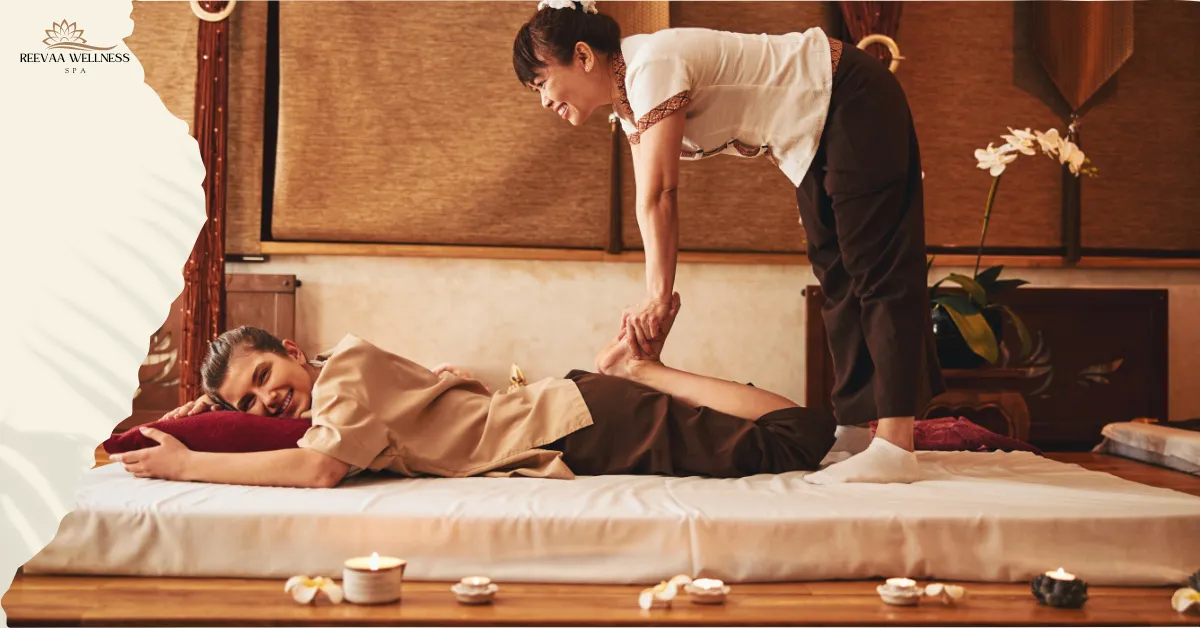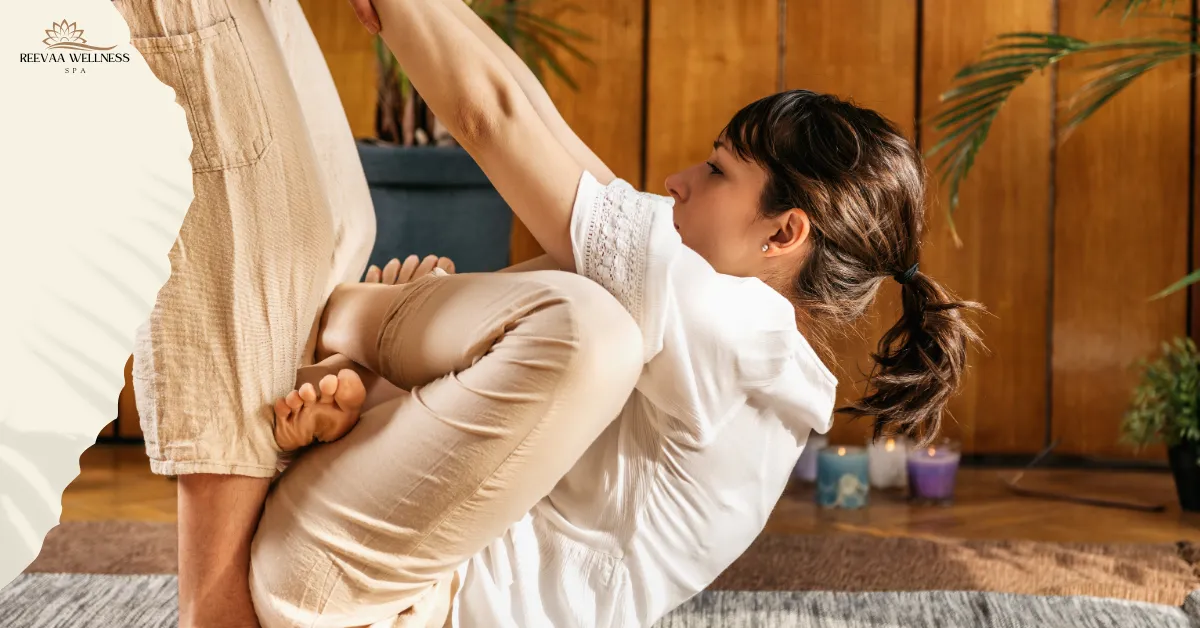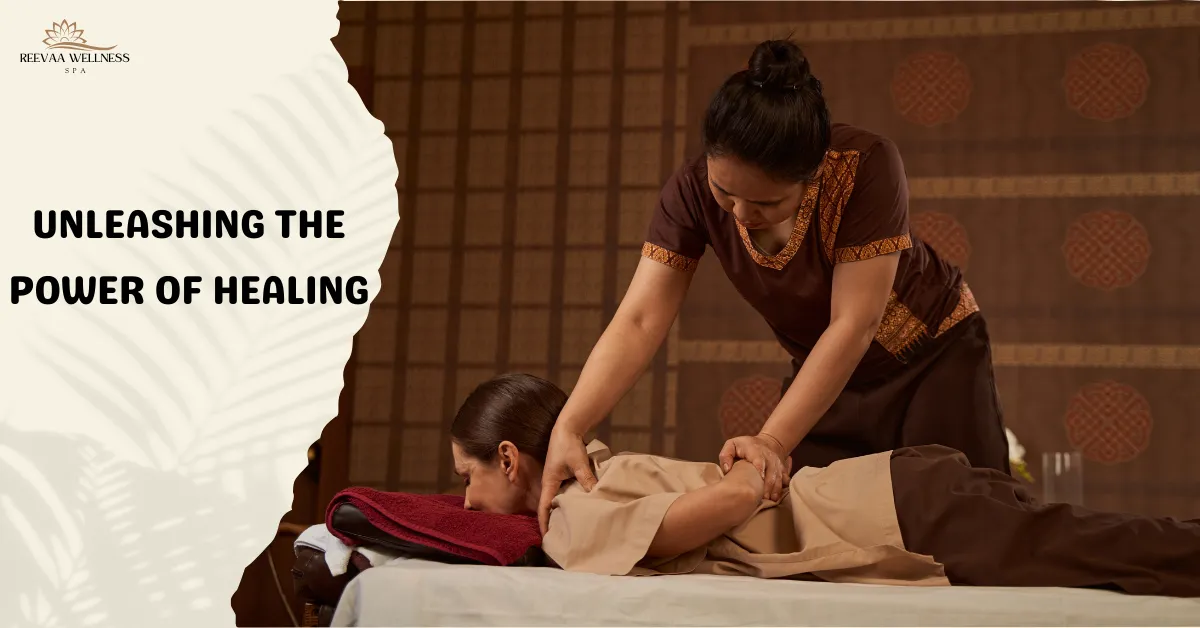Table of Contents
Thai Massage Therapy, often referred to as “Thai Yoga Massage,” is a traditional healing practice that has been cherished for centuries in Thailand and across Southeast Asia. Unlike conventional Western massage techniques that primarily focus on muscle relaxation through rubbing or kneading, Thai Massage Therapy at Reevaa Wellness Spa offers a more integrative approach. This unique therapy incorporates a series of gentle rocking, deep stretching, rhythmic compressions, and acupressure techniques, all aimed at balancing the body’s energy and promoting holistic well-being.
At Reevaa Wellness Spa, we believe that wellness is not just about relaxation; it’s about achieving a harmonious balance between the body, mind, and spirit. Our skilled therapists are trained in the ancient art of Thai Massage Therapy, ensuring that each session is tailored to meet your individual needs. Whether you’re seeking relief from physical tension, stress reduction, or an overall sense of well-being, Thai Massage Therapy at Reevaa Wellness Spa offers a comprehensive solution that goes beyond the surface to rejuvenate your entire being.
Explore the transformative power of Thai Massage Therapy in a serene and welcoming environment, and let Reevaa Wellness Spa guide you on your path to optimal health and wellness.
Thai Massage Therapy History and Origin

Thai Massage Therapy has a rich history that dates back over 2,500 years. It is believed to have been developed by a renowned physician named Jivaka Kumar Bhaccha, a contemporary of the Buddha. Over the centuries, this healing practice was influenced by a variety of cultural and medical traditions, including Ayurveda from India, Traditional Chinese Medicine, and Indigenous Thai healing practices.
The spread of Buddhism throughout Southeast Asia played a significant role in the propagation of Thai Massage Therapy. Monks and nuns in Buddhist temples would often perform this therapeutic massage on one another as part of their monastic duties. The techniques were passed down through generations, often in an oral tradition, and were closely guarded secrets within families or monastic communities.
Thai Massage Therapy Philosophy
At the core of Thai Massage Therapy is the belief in the flow of life energy, or “Prana,” through the body’s energy lines, known as “Sen.” These Sen lines are believed to be the pathways through which energy flows, and blockages in these lines can lead to physical discomfort, emotional distress, and a general sense of imbalance in the body and mind.
Thai Massage Therapy aims to release these blockages by applying pressure along the Sen lines, combined with gentle stretching and manipulation of the body. This holistic approach not only addresses physical tension but also promotes mental clarity, emotional balance, and spiritual well-being.
The Techniques of Thai Massage Therapy
Thai Massage Therapy is a dynamic and interactive form of bodywork that combines elements of acupressure, assisted yoga postures, reflexology, and meditation. The therapist uses their hands, thumbs, elbows, forearms, knees, and feet to apply pressure, stretch, and manipulate the body.
Acupressure
This technique involves applying steady pressure to specific points on the body, known as acupoints, which correspond to the Sen lines. By stimulating these points, the therapist helps to release blocked energy and restore balance.
Stretching
Thai Massage Therapy incorporates a variety of deep stretches that are similar to yoga postures. These stretches help to increase flexibility, improve circulation, and release tension in the muscles and joints.
Rhythmic Compression
The therapist uses their body weight to apply rhythmic compression along the Sen lines. This technique is particularly effective in relieving deep muscle tension and promoting relaxation.
Joint Mobilization
Gentle movements of the joints help to increase the range of motion and reduce stiffness. This technique is especially beneficial for individuals with joint pain or stiffness.
Meditative Awareness
Thai Massage Therapy is often performed in a meditative state, both by the therapist and the recipient. This mindfulness helps to enhance the therapeutic effects of the massage and promotes a deep sense of relaxation and inner peace.
The Benefits of Thai Massage Therapy

Thai Massage Therapy offers a wide range of physical, mental, and emotional benefits. It is a versatile therapy that can be tailored to meet the individual needs of each recipient. Some of the most notable benefits include:
Relief from Physical Pain and Tension
Thai Massage Therapy is highly effective in relieving chronic pain and tension, particularly in the back, neck, shoulders, and legs. The deep pressure and stretching techniques help to release tight muscles, reduce inflammation, and improve blood circulation.
Increased Flexibility and Range of Motion
The assisted yoga postures and stretching techniques used in Thai Massage Therapy help increase flexibility and improve joint range of motion. This is particularly beneficial for physically active individuals or those recovering from injuries.
Improved Circulation
The rhythmic compression and stretching techniques used in Thai Massage Therapy help to stimulate blood flow and improve circulation throughout the body. This increased circulation delivers more oxygen and nutrients to the tissues, promoting faster healing and overall vitality.
Stress Relief and Mental Clarity
Thai Massage Therapy is a deeply relaxing experience that helps to reduce stress and anxiety. The meditative aspect of the practice also promotes mental clarity and a sense of inner calm.
Enhanced Energy Flow
By releasing blockages in the Sen lines, Thai Massage Therapy helps to restore the flow of life energy, or Prana, throughout the body. This enhanced energy flow leads to improved physical health, emotional balance, and spiritual well-being.
Detoxification and Immune System Support:
Thai massage therapy stimulates increased circulation and lymphatic drainage, which helps detoxify the body and boost the immune system. This can lead to better overall health and a reduced risk of illness.
Emotional Healing and Balance
Thai Massage Therapy is a holistic practice that addresses not only the physical body but also the emotional and spiritual aspects of the individual. It can help to release stored emotions, promote emotional healing, and restore a sense of balance and well-being.
The Role of Thai Massage Therapy in Modern Wellness

In today’s fast-paced world, where stress and physical discomfort are common, Thai Massage Therapy offers a natural and effective way to restore balance and promote overall health. It is increasingly being recognized as a valuable complementary therapy in both clinical and wellness settings.
Thai Massage Therapy in Clinical Settings
Thai Massage Therapy is being integrated into clinical settings as a complementary therapy for various health conditions. It is particularly beneficial for individuals with chronic pain, musculoskeletal disorders, and stress-related conditions. Many hospitals, rehabilitation centers, and wellness clinics now offer Thai Massage Therapy as part of their treatment programs.
Thai Massage Therapy in Wellness and Spa Environments
Thai Massage Therapy is a popular choice in wellness centers and spas around the world. Its unique combination of physical therapy, relaxation, and spiritual healing makes it a sought-after treatment for those seeking holistic wellness. Whether you’re looking to relieve physical tension, reduce stress, or enhance your overall well-being, Thai Massage Therapy offers a comprehensive approach to health.
Thai Massage Therapy for Athletes
Athletes can benefit greatly from Thai Massage Therapy, as it helps to improve flexibility, prevent injuries, and speed up recovery after intense physical activity. The deep stretches and joint mobilization techniques are particularly effective for maintaining optimal physical performance.
Thai Massage Therapy for Stress Management:
In our modern world, where stress is a major contributor to a wide range of health issues, Thai Massage Therapy provides a powerful tool for stress management. Its calming effects on the mind and body make it an ideal therapy for those looking to reduce anxiety, improve sleep, and achieve a greater sense of peace and relaxation.
Thai Massage Therapy for Holistic Health
Thai Massage Therapy is a holistic practice that addresses the body, mind, and spirit. It is an excellent choice for individuals seeking to achieve overall health and well-being. By balancing the flow of energy in the body, Thai Massage Therapy promotes physical health, emotional balance, and spiritual growth.
Conclusion
Traditional Thai massage therapy is a powerful and effective way to relieve stress, improve flexibility, and enhance your overall well-being. Whether you’re dealing with chronic tension or just need a break from the demands of daily life, Thai massage offers a holistic approach to relaxation and healing. By incorporating regular Thai massage sessions into your wellness routine, you can experience lasting benefits for both your body and mind.
If you’re new to Thai Massage Therapy, it’s important to find a skilled therapist who can guide you through the process and customize the treatment to suit your needs. At Reevaa Wellness Spa, our qualified therapists offer expert Thai Massage Therapy, combining acupressure, stretching, and energy balancing. This unique approach is perfect for relieving stress and helping you find greater balance and harmony in your life.
Stay tuned for our next blog, where we’ll explore the benefits of Deep Tissue Therapy. If you want to learn more about our Spa and the services we offer, visit us at Reevaa Wellness Spa.
FAQ
1. What is Thai Massage Therapy?
Thai Massage Therapy is a traditional therapeutic practice that combines acupressure, Indian Ayurvedic principles, and assisted yoga postures. It aims to improve flexibility, relieve muscle tension, and balance the body’s energy.
2. What are the benefits of Thai Massage Therapy?
Thai Massage Therapy offers a range of benefits including improved flexibility, enhanced circulation, reduced stress, relief from muscle and joint pain, increased energy levels, and a greater sense of overall well-being.
3. How does Thai Massage Therapy work?
During a Thai massage session, the therapist uses their hands, feet, elbows, and knees to apply pressure along energy lines (Sen lines) on the body. The therapist may also guide you through various stretches and yoga-like postures to help release tension and improve mobility.
4. Is Thai Massage Therapy suitable for everyone?
Thai Massage Therapy is generally suitable for most people, but it may not be recommended for individuals with certain medical conditions, such as severe osteoporosis, recent surgeries, or specific injuries. It’s always best to consult with a healthcare professional before beginning any new therapy.
5. What should I expect during a Thai Massage Therapy session?
During a session, you will typically wear loose, comfortable clothing. The therapist will work with you to perform a series of stretches and pressure techniques. Sessions usually last between 60 to 90 minutes, and you may experience a deep sense of relaxation or temporary soreness afterwards.
6. How often should I receive Thai Massage Therapy?
The frequency of Thai Massage Therapy sessions depends on individual needs and goals. Some people may benefit from weekly sessions, while others might opt for monthly treatments. Your therapist can help you determine a schedule that works best for you.
7. How can I prepare for a Thai Massage Therapy session?
Arrive hydrated and avoid heavy meals shortly before your session. Wear loose-fitting clothing and communicate any specific areas of tension or discomfort to your therapist. It’s also helpful to arrive a few minutes early to relax and prepare mentally.
8. Are there any side effects of Thai Massage Therapy?
Most people experience positive effects from Thai Massage Therapy, but some might feel sore or experience mild discomfort after their first few sessions. These sensations are usually temporary and should subside as your body adjusts to the therapy.
9. How do I find a qualified Thai Massage Therapist?
Look for licensed and experienced therapists who specialize in Thai Massage Therapy. Reading reviews, checking certifications, and asking for recommendations from friends or healthcare providers can help you find a qualified practitioner.
10. Can Thai Massage Therapy be combined with other treatments?
Yes, Thai Massage Therapy can complement other treatments, such as chiropractic care, physical therapy, or acupuncture. However, it’s important to discuss your treatment plan with both your Thai massage therapist and other healthcare providers to ensure coordinated care.

